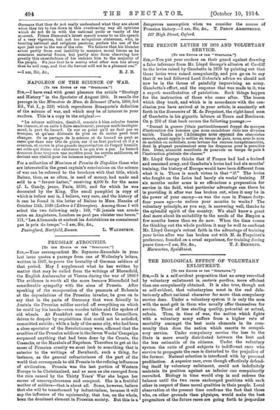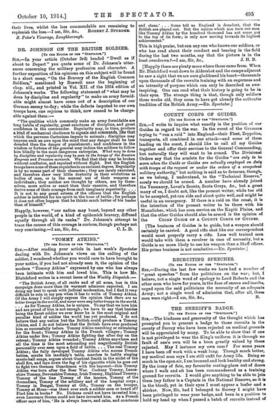THE BIOLOGICAL EFFECT OF VOLUNTARY ENLISTMENT.
[TO THE EDITOR OF THE "SPECTATOR."] SIR,—It is a self-evident proposition that an army recruited by voluntary enlistment is, caeteris paribus, more efficient than one compulsorily obtained. It is also true, though not so self-evident, that voluntaryism must in the end dele- teriously affect national character far more than compulsory service does. Under a voluntary system it is only the men with the most grit in them who usually offer themselves for service. Those of less sterling quality, potential or actual, refrain. Thus, in time of war, the nation which fights with a voluntary army suffers from a higher rate of mortality amongst the best male elements in its com- munity than does the nation which resorts to compul- sory service. Under compulsory service the loss to the State is more evenly distributed between the best and the less estimable of its citizens. Under the voluntary system the ratio of good subjects to indifferent ones who survive to propagate the race is disturbed to the prejudice of the former. Natural selection is interfered with by personal predilection. A superior race, even though effectively defend.. ing itself by voluntary enlistment, could not indefinitely maintain its position against an inferior one compulsorily recruited. Biology in time would step in and redress the balance until the two races exchanged positions with each other in respect of these moral qualities in their people. Local observation at the present time confirms the fact that those who, on other grounds than physique, would make the best progenitors of the future races are going forth to jeopardize
their lives, whilst the less commendable are remaining to



































 Previous page
Previous page